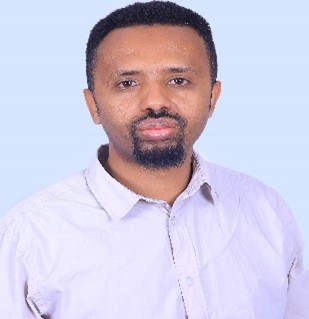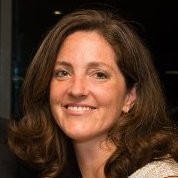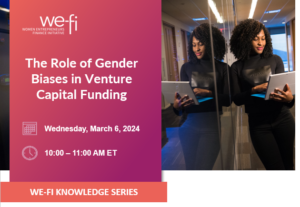Co-organized by:

Background:
Access to financial capital is one of the most important and challenging problems women entrepreneurs face in growing their ventures. The gender financing gap is especially apparent in the equity financing space. In 2021, less than 15% of venture capital dollars went to companies with a woman on the founding team. Deep-rooted discriminatory practices and stereotypical attitudes have a documented impact on this funding gap, which may stem from male investors’ belief that WSMEs are riskier or simply that entrepreneurship itself is more of a male than female sphere.
In collaboration with EBRD, We-Fi is organizing this webinar to share new evidence on gender biases in venture capital and explore the topic from an academic as well as practitioner perspective. The webinar will feature recent research findings as well as insights from implementation and discuss how to bring new evidence to the design and implementation of projects.
Research to be Discussed:
10:00 AM: Opening remarks by We-Fi and EBRD
- Wendy Teleki, Head of the We-Fi Secretariat
- Michelle Brock, Senior Economist at EBRD
10:05 AM: Academic Paper Presentations
- Camille Hebert, Assistant Professor at University of Toronto: Presenting “Gender Stereotypes and Entrepreneur Financing”
- Amisha Miller, Assistant Professor at New York University Stern School of Business: Presenting “Asking Better Questions – The Effect of Changing Investment Organizations’ Evaluation Practices on Gender Disparities in Funding Innovation”
10:35 AM: Discussant
- Girum Abebe Tefera, Senior Economist at the World Bank Gender Innovation Lab
10:40 AM: Insights from Implementation (We-Fi Projects)
- Laurien Field, Global Head Startup Catalyst and Global Gender Lead for Disruptive Technologies and Funds at IFC
- Aun Rahman, Financial Sector Specialist, World Bank
10:50 AM: Q&A

Camille Hebert, Assistant Professor of Finance, University of Toronto
Camille Hebert joined the University of Toronto as an Assistant Professor of Finance in 2019. She holds a Ph.D. in Finance from Tilburg University, the Netherlands, and a master’s degree from the University of Paris Dauphine. Camille’s research interests include entrepreneurial finance, labor and finance, and topics related to inequalities in financial markets. She also received a large grant from the Social Sciences and Humanities Research Council of Canada (SSHRC) to study Inclusive Innovation and Entrepreneurship Networks. She is also an affiliate faculty at the Gender and the Economy Research Institute at Rotman and the Women Entrepreneurship Knowledge Hub in Canada.

Amisha Miller, Assistant Professor of Management and Organizations, New York University
Amisha Miller joined New York University Stern School of Business as an Assistant Professor of Management and Organizations in September 2023. Amisha’s research interests are decision-making practices in entrepreneurship and innovation contexts, with a focus on ramifications for inclusion and inequality. Specifically, she studies how entrepreneurs form entrepreneurial strategy when embedded in communities, and how investors evaluate startups when embedded in organizations. Prior to joining NYU Stern, Amisha worked in varied entrepreneurship research and policy roles in funding organizations such as the Kauffman Foundation, consulted for governments and organizations such as the UN and the OECD, worked in nonprofits, and as an entrepreneur.

Girum Abebe, Senior Economist, World Bank’s Africa Region Gender Innovation Lab (GIL)
Girum relies on field experiments to study ways of making social programs more responsive to the needs of socially disadvantaged groups, including women, young people, and refugees. He studies how active labor market policies, productive safety nets, land rental systems and business training programs can be leveraged to promote the inclusion of disadvantaged youth and women into productive wage- and self-employment. He has co-authored research papers published in the American Economic Review, Review of Economic Studies, and Journal of Development Economics, among others. Girum holds a Ph.D. in Development Economics from the National Graduate Institute for Policy Studies (GRIPS) in Tokyo

Laurien Field, Global Head of Startup Catalyst and Global Gender Lead for Disruptive Technologies and Funds at IFC
As Global Head of Startup Catalyst, Laurien leads a global investment program focused on enhancing access to early-stage capital and expertise in emerging and frontier markets, in order to build tech ecosystems that drive entrepreneurship, boost innovation, and create jobs. As Global Gender Lead for Disruptive Technologies and Funds, she leads IFC’s efforts to address gender inequality in the venture capital and private equity sectors through investments, thought leadership and technical assistance programs. Laurien has over fifteen years of experience in the PE and VC sectors. She is currently based in Bangkok, where she focuses on investments in Asia – both direct and through funds – for several years, including representing IFC on the Advisory Committees of several funds investing in South and South East Asia.

Aun Ali Rahman, Financial Sector Specialist, World Bank
Aun Rahman, Financial Sector Specialist with focus on early-stage finance at the World Bank Group and Project Manager of the We-Fi Investment Readiness Program in Pakistan. Aun specializes in developing innovative financing mechanisms to increase capital flows to early-stage entrepreneurs in emerging and frontier markets. His current areas of focus include venture capital, seed funds, angel investing, and investment readiness programs. Aun oversees the development and implementation of a VC Fund of Funds program (and related initiatives) in Egypt and startup finance programs in other MENA countries. Prior to this, he led the build-out of the first set of angel networks in the Caribbean and developing clean-tech venture funds in Kenya and Ghana. Before joining the World Bank, Aun was the founding Country Director/CEO of Acumen Fund Pakistan from 2006-12.

Michelle Brock, Senior Research Economist at EBRD
Michelle is a Senior Research Economist at the EBRD, visiting researcher at Imperial College London, and affiliate of CEPR. Her research focuses on financing women-led SMEs, inequality of opportunity, migration, and entrepreneurship. Her work on gender and finance focuses on the role of implicit bias in lending decisions for women-led enterprises. Michelle investigates these topics through the lens of behavioral economics and individual decision making under risk and uncertainty. She holds a PhD from the University of Maryland.

Wendy Teleki, Head of the We-Fi Secretariat
Wendy Teleki is Head of the We-Fi Secretariat, which is housed in the World Bank Group. The Secretariat is responsible for supporting the We-Fi Governing Committee in the allocation and supervision of We-Fi funding as well as communications, advocacy, and learning focused on strengthening opportunities for women entrepreneurs in collaboration with the GC, Implementing Partners and other stakeholders. Ms. Teleki joined We-Fi in May 2019. Prior to that, Ms. Teleki worked with the International Finance Corporation leading numerous activities and initiatives focused on small and medium enterprise development in emerging markets around the world. This included several blended finance, investment and advisory programs, including IFC’s We-Fi program and the Global SME Finance Initiative. Wendy has an MBA in Finance from the Wharton School of Business and an MA in International Economics from the Johns Hopkins School of Advanced International Studies.


